
PoolDoctor
-
Posts
157 -
Joined
-
Last visited
Content Type
Profiles
Forums
Downloads
Posts posted by PoolDoctor
-
-
The frightening thing is, business owners in this country see this and interpret as an example of "permissable" behavior; business disputes (which normally occur in the event of typical business dealings) are often settled in Thailand at the end of a gun. I used to work for a Thai automobile manufacturer a long time ago, and it was no secret (he even showed us one day) the general manager sat with a .38 in his desk drawer. Lack of law, combined with machismo and stilted development, make a scary recipie.
-
I am also a homeowner in SRV Pattaya and Koh Chang. Recently, many of the homeowners have organized themselves into a de-factor association to work together with the developer in Pattaya to address some common concerns (security, stray dogs, etc). I also sit on that association.
There is now an ongoing and positive dialogue happening between the developer and the homeowner association - things are moving in the right direction with some nice new announcements coming up. The current economic situation has likely contributed to slow sales, which has hindered on going development of the compound. Yes, there are some things that need addressing, but it is clear that a huge majority of the homeowners are committed to working together to improve the situation. Regular association meetings are now happening, improved communication and understanding, etc., we are hoping that this trend continues and that SRV Pattaya will be one of the nicest and most admired compounds in Pattaya. That is the ultimate goal of the homeowner association, and we are working hard to achieve that goal.
Gil
Are you just a homeowner there or are you actually the developer or at least part of the management?

Just a homeowner, looking to protect my investment in the home purchase. I happen to believe that if SRV is managed properly, its a great place to live. Close to Pattaya, great highway access, wide roads, killer views, etc. The current challenges facing SRV have to do with overall management of the compound, ensuring a lively and active homeowner association, and continued infrastructure development.
-
I am also a homeowner in SRV Pattaya and Koh Chang. Recently, many of the homeowners have organized themselves into a de-factor association to work together with the developer in Pattaya to address some common concerns (security, stray dogs, etc). I also sit on that association.
There is now an ongoing and positive dialogue happening between the developer and the homeowner association - things are moving in the right direction with some nice new announcements coming up. The current economic situation has likely contributed to slow sales, which has hindered on going development of the compound. Yes, there are some things that need addressing, but it is clear that a huge majority of the homeowners are committed to working together to improve the situation. Regular association meetings are now happening, improved communication and understanding, etc., we are hoping that this trend continues and that SRV Pattaya will be one of the nicest and most admired compounds in Pattaya. That is the ultimate goal of the homeowner association, and we are working hard to achieve that goal.
Gil
-
-
Its amazing to me the amount of misinformation here. For example, "its a hole in the ground with some rudimentary piping and parts from China." This is probably the single biggest mistake made when building a pool - underestimating the complexity. Its all fine and good until: (we have seen this all)
1. Lack of planning - heavy machinery damages surrounding area
2. Excavation results in water flooding or high water table content - now what?
3. Design drawings do not correspond with survey results
4. Failure to do bore test, flying blind regarding sink piling
5. CPAC concrete mixture innappropriate; no vehicle access; drying too fast;
6. Piping laid under the pool rather than in the floor; failure to pressure test piping
7. Surge tank on the wrong side of the pool (we just fixed this weeks ago on a site).
8. Water stops ommitted - oops!
9. Walls forms have slipped resulting in wall deformation
10. Floor topping not adhering; lack of scrabbling
11. Spatter dash not used on walls; plaster not firmly adhering
12. Tile set out not correct, un professional looking tile installation (looks like a child did it)
13. Lights and j-boxes incorrectly installed, or wired wrongly
14. Overflow gutter wrong size, wrong height and or failure to slope
15. Piping to equipment room installed wrongly opening up possibility of breaking
etc., etc, the point is, many things can go wrong if the contractor is not experienced.
-
What's the difference in margins between buying the physical stock vs. not having the stock?
Best to send me an email if you're interested.
Gil
-
Yikes! Who would ever install a salt water system with all those cons! My own pool is salt water, and nothing could be easier. I never adjust chlorine, top up the salt once a month or so (for pennies) and throw a vacuum on it 2x per month. That's it. On the flip side, I get crystal clear water all the time (even during thunderstorms), a stable pH, no need to buy and store chlorine, my kids are swimming in safe saline, and I never have to worry about acidic chlorine destroying my grout. Salt water is silky smooth, and no harsh chlorine odor after.
There is a statistic that 80% of pools in Australia are now salt water pools. Pumps and pool fittings are now 100% plastic, so there is no corrosion risk. Yes, salt water systems do require a bit more operating knowledge, that is one of the troubles with Thailand - technicians are lazy to understand new technology. I agree with you though, the purchase cost is often not off set by reduced operating costs - we make it a point NOT to sell a salt system on this virtue. It doesn't hold, except in the case of a leaking pool that is losing chemicals (salt is 10x cheaper than chlorine). The cells also usually need replacement every 4 years or so, and Thailand's electrical supply surges can sometimes knock out a sensitive control panel if not wired properly to a breaker / overload.
Gil
-
Ye ole bucket test.
 Its great also for figuring out how fast a pool is leaking...
Its great also for figuring out how fast a pool is leaking...RE pH its great to see this increased awareness. We love re-grouting business, but after several hundred pools its getting a bit old now...proper pH is the single most important water chemistry parameter there is - it prevents damage, makes the pool safe, and signficantly impacts the role of chlorine.
Gil
-
Early last year, we invested heavily in pool safety fencing. This included enough stock for at least 50 pools, and with a product that we believed to be one of the highest quality on the market. We also flew over from the U.S. an installation expert, who trained us in installation, tools, tips, etc. The response we received was excellent - we now have a large number of references, with installations continuing weekly (this week another 2). We like to think that we are doing our small part to raise the safety standards in Thailand - if we prevent just one accident, it has been worthwhile.
We are now seeking dealers outside of BKK / Pattaya. This would include Phuket, Samui, ChiangMai, Hua Hin, and other major centers. If you are interested in becoming a dealer please contact us at www.thepooldoctorsthailand.com we have a variety of options (e.g., hold stock vs. not hold stock) to make it easy. As we are doing another 2 installations this week (1 in BKK, 1 in Pattaya), you are also free to visit and see for yourself how it all works.
Thank you,
Gil
-
How could these people be so idiotic? Don't they read newspapers?
-
Regrouting in Thailand is usually done at a total cost, rather than a price per sqm. There are many different types of grout, and brand names also. Also, the complexity of the job (stairs, grout width, tile type, etc) will affect pricing. Usually, there are broken tiles involved, and or replacement of fittings (e.g., returns, main drain, etc) and we try to look at the lights at the same time. Generally, when the pool is empty, we try to knock as many things out as we can. Refilling and re-balancing then is required, and a re start of all systems.
Gil
-
Actually, for 75,000 liters, you will need about 3,000grams (3kg) to raise pH by 1.0. Assuming your pH is about 4.0 to raise it by 3 (to reach 7.0) you would need at least 10kg. Standard pool water treatment tables are widely available on the net. Simply plug in your volume / desired pH level, and see the required volume of soda ash.
Before doing anything though, I would take a bucket of the pool water and adjusts its pH independently using a small quantity of soda ash. Reason being, I would want to make sure that nothing else is going on (e.g., high chlorine bleaching out your pH readings) before dumping all that soda ash in the pool. If you can raise the pH in the bucket of water, then I would say you can also do it in the pool. A digital testor will show you readings in real time though, making it far more accurate than litmus strips.
Gil
-
Yes, high alkaline levels act as a pH stabilizer; alkaline "locks" in pH making it hard to adjust (but great for pool management since we do not need to adjust pH often). Any good testing kit (litmus strips) will include alkaline testing. Also, with very low pH, more soda ash may be required (6kg is not that much).
Gil
-
We re-grout about 4 pools a month; this is a completely uneccessary situation if only pool owners or operators would manage their pH more closely. It is one of the more amusing parts of our job - we visit a hotel or pool, and explain about water chemistry. As they listen to us glassy-eyed, I can see their skepticsm. "Let's just go back to chucking a handful of chlorine into the pool" is written all over their face. Lo and behold, we are called back to drain, re-grout and refill the pool at a huge cost when compared to checking pH daily digitally. The world-wide standard of pH is 7.2-7.8. 80% of all pools we spot check have pH of about 3.0. Is it any coincidence I wonder that 90% granular chlorine (the favorite in Thailand) also has a pH of about 3.3? The chlorine has lowered the pH!. Low pH is acidic water, and water will dissolve just about anything over time. Why accelerate this then? Once the grout is gone, the next thing will be lifiting tiles. Ouch.
Managing pH also has another huge benefit - your eyes don't sting or hurt when under water. Why? Because the pH of the human eye is about 7.2. When pH is managed closely, only a very small amount of chlorine is needed to keep ORP levels sufficient for clean water. When pH is high, the water is alkaline, also not great because the oxidation ability of chlorine declines very rapidly at high pH levels - meaning you need 4 or 5 times the amount of chlorine in the water to reach a similar and sufficient ORP level. With all of these benefits then, why do customers continue to ignore pH? TIT. See pictures.
-
 1
1
-
-
Yikes that's because acid is used to LOWER the pH. Soda Ash is used to raise pH.
You need to be very careful now, and increase the pH quickly. Otherwise, you are in danger of harming the pool grout if the pool is a tiled one.
Also, make sure that you check alkalinity also - sodium bicarb is used to increase alkalinity.
Gil
-
-
Pictures of what we discovered upon removal of the liner...will post after pictures in about 3 weeks...
These pictures give a good sense of what happens when the client is not around during construction...
http://www.thepooldo...8&t=29&p=42#p42
Regards,
Gil
-
Hi, generally, true pool mastic is not easily found in Thailand. Not all general contractors understand the role of mastic, and the role of expansion joints in general (this is why you see a lot of cracked gravel wash in Thailand). There are just a couple of speciality products on the market, available from construction supply companies.
When you mention "leaking" of the mastic, what did you mean? Mastic is not a water barrier, but is designed to provide flex between the pool deck, underlying support structure, and the pool itself (two independent structures). True mastic expands and contracts with heat also, and is usually not intended as a true water sealant. I would say that most general contractors use a generic silicone, or flex puddy, which usually does the trick fairly well. Replacement cost is very economical, but I do not have a rate (we did a pool a long time ago fixed price job with deck repair).
Gilbreth Hi,How long does the silicone mastic sealant last on a pool ? Mine seems to be leaking and how much should I expect to pay to have the old stuff removed and re sealed ?. The pool is 76 SQ metres
-
For daily maintence, the fastest, easiest and cheapest way to measure chlorine and pH is via a handheld ph & ORP meter (ORP is better than measuring chlorine because it takes into account related pH at the same time). For example, at high pH, even high levels of free chlorine become meaningless. For alkalinity, cyuranic acid, etc., these don't need to be measured more than 1 x per month, test strips are fine and very accurate, easy to read, and widely available in Thailand.
There are also in-line pH and ORP sensors that measure continously and output to a small digital panel. Great for commercial pools or large residential pools.
Gil
-
The question as to whether it is any good should really be preceded by asking yourself: Do you really need it?
For a correctly maintained pool, all that is needed is a simple chlorine and ph test kit. There is a point at which the problems of even most troublesome pool will be resolved, setting the formula for on-going care.
Generally, only constructors, expert trouble-shooters, or people offering a regular weekly pool service would need any of the the equipment mentioned here. You may find it more economical to ask a special to visit your pool to take stock of the water quality and any related problems, and follow his advice for the future.
You may also find that if these testers are not marketed in Thailand, you will be constantly in need of obtaining the test sticks or swabs. The bottom line is that for a normal consumer with a domestic pool, they are not really much of an advantage over the 350 baht plastic test tube system with their graded colour scales and the dropper bottles for the test fluids - it doesn't have to be done every day.
I'm a bit of a gadget man and like to know the in's and out's of things. I have a cheap 350 baht tester and I'm sure it works fine but I also like to go the little bit extra to make sure. I'm also not to concerned about price of things.
Getting replacement consumables, strips etc for non-thai equipment is no problem either as there are always friends and family coming out here for a holiday.
I'm not 100% confident in my pool guy, (he uses the same kind of tester as myself) and doesn't use it properly as per the instructions. i.e. taking the water sample from a depth of, blah blah, not near return water outlets and I'm sure he doesn't keep it in a cool dark place when not in use. (If I was around all the time then I wouldn't have a pool guy, I'd do it all myself).
Anyway, just interested in new 'toys' and technology and getting accurate results etc.
I like the look of the tester above posted by cdnvic. Can you get it in Thailand? If so I'd be interested.

I have been trying to fid this stuff, there is a pool shop in puket but it is expensive and basic. I am getting a friend to bring over some from the US for me. one is a remote sensor and continously monitors PH and clorine to a small screen in the house it also tells you what chemicals are required and how much to add. http://www.lesliespo...20?viewall=true
-
Hi, we carry both the testors (ph & ORP) and cyuranic. All on our site.
Best,
Gil
? This is the swimming pool forum no?
Hi,
Without seeing any pictures, I am going to go out on a limb and assume that you are getting some black algae in the pool. Attaching example picture here. This is reinforced by your comment that they can be removed by chiseling (there are steel algae brushes avail). Black algae must be treated in two ways - chemically, and brute force. First thing - check your pH, and drop your pH to 7.0. This is slightly acidic, but it boosts the efficiency of chlorine upwards greatly. 2nd, check free chlorine digitally, or more accurately, check ORP and keep it above 600 (lots info on the 'net regarding ORP). Don't waste your time with DPD or OPD testing kits, regents, etc., just get yourself a decent handheld pH and ORP tester. It will pay for itself time and time again.
Finally, treat the pool with a black algae-cide as per directions. While doing this, you must brush the pool vigorously - black algae covers itself in a protective hard shell which must be penetrated first for the chemicals to seep in and do their work. Likely, black algae has taken hold during the rainy season, and you have allowed ORP or free chlorine levels to drop too far. Or, at a similar ORP level, your pH has risen (high pH inhibits oxidation power of chlorine - at 8.0 pH I think efficiency of chlorine drops to like 15% or something like that).
Is your pool a salt or chlorine system? If its a salt system, do you have enough cyuranic acid in the water?
Hi PD.
I have a fairly new salt water pool in Roi Et and am just learning about how to maintain it. Recently we too have noticed some small black dots similar to those described above which we have been scraping off. I do have a gallon of black algeacide but haven't used it yet. Recently the water has been very warm so this could be affecting free chlorine content. You mention the need to measure this and / or ORP. My questions are: What is ORP and how / where do I buy a decent handheld pH and ORP tester. Also where, and in what form, can I buy cyuranic acid to stabilise the chlorine content?
-
This looks to me like a plaster pool, common in Southern Cal. A foot every 4 hours is also very fast, a leak that fast would likely be in the piping system, and on the suction side rather than a discharge side leak. No telling though without more information. Many high quality international brands as well as US brands are available in that area - limited only by your budget. No need to with cheaper brands (Jacuuzi, Jandy, Astral, etc are all good).
If you want, send me your contact details and I can put you in touch with our US office - The Pool Doctors are based in Southern Cal - they have a number of offices in that location.
Gil
-
After maintaining, repairing, renovating and tiling at least a hundred pools in Thailand, I thought I had seen everything. Alas, even an old dog learns new tricks. My own pool developed a leak, but we were on several big jobs and I had no extra staff to come and fix it for me. It was the cold season anyway, so I drained it, and let it go. Sure enough, effloressence set it, and covered the pool in ugly deposits. They're too hard for scotchbrite, but a chisel would scratch the tile. Hmn. Dilema. Then, I noticed one of my guys making rapid headway in the corner. Viola! He was using a bit of broken tile, and it works perfectly. Its just slightly softer than the good tiles, but hard enough to remove the calcium deposits. Its also fast! Picture here.
-
Usually, water and chems are a line item in the invoice. Question - who is paying for the chemicals? If they are, then you have a "turn-key" contract, and they would be responsible for the water also. Final payment would only happen when the pool is full, balanced, and operating correctly (check for equipment leaks!).
On the other hand, if they asked you to pay for the chemicals, then it would seem they feel like their scope of work ends at completion of the pool, and you are responsible for filling, balancing and comissioning start up (not sure why they would feel this way though).
.png.3b3332cc2256ad0edbc2fe9404feeef0.png)
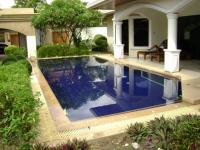
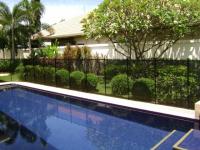
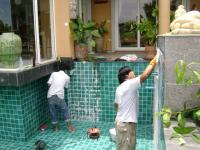
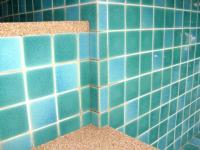
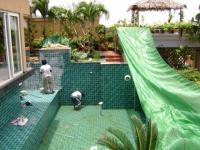
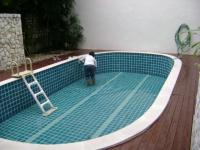
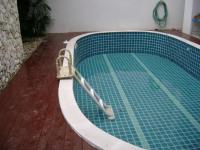
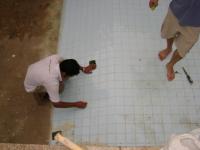
Siam Royal View
in Pattaya
Posted
I think everyone has noticed construction of a new smart card security system at SRV Pattaya. The executives from the homeowner association have been working closely with SRV management to improve security. The ropes simply did not work, and we are hoping that this automated system will cut down on entering SRV without proper screening. At the minimum, it will look better and more professional.
Gil